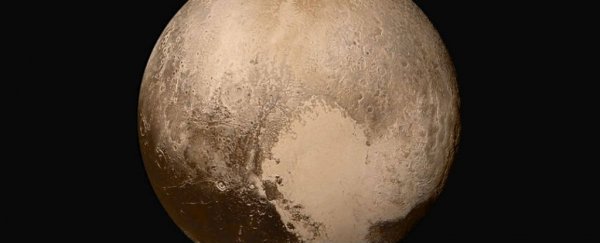It's been 12 years since everyone's favourite dwarf planet Pluto officially lost planet status. And ever since there's been no end to the debate over whether or not that was the right call.
Now a team of experts say the reason it was demoted in the first place isn't valid. And, you guessed it, they're calling for Pluto's planet title to be restated.
Pluto was officially declassified as a planet by the International Astronomical Union in August 2006, after the global group of astronomy experts updated the requirements of what makes a planet, adding a third criteria.
"A celestial body that (a) is in orbit around the Sun, (b) has sufficient mass for its self-gravity to overcome rigid body forces so that it assumes a hydrostatic equilibrium (nearly round) shape, and (c) has cleared the neighbourhood around its orbit."
That third criteria means an object has to be the dominant body in its orbital path with enough mass to either recruit or bump out any other space rocks in the area.
While Pluto ticked off the first two requirements for being a planet, it fell short of clearing its orbit, which it shares with a whole bunch of Kuiper belt bodies.
But a new study published on Wednesday claims that this last criterion isn't supported by the scientific literature.
After reviewing published research from the past 200 years, a team of researchers from the University of Central Florida found only one publication in 1802 that used the clearing-orbit requirement to classify planets. And that was based on reasoning that went on to be disproven.
"The IAU definition would say that the fundamental object of planetary science, the planet, is supposed to be a defined on the basis of a concept that nobody uses in their research," says first author Philip Metzger. "And it would leave out the second-most complex, interesting planet in our Solar System."
On top of that, the team found scientists have routinely called moons such as Saturn's Titan and Jupiter's Europa planets since the time of Galileo.
"We now have a list of well over 100 recent examples of planetary scientists using the word planet in a way that violates the IAU definition, but they are doing it because it's functionally useful," says Metzger.
"It's a sloppy definition … They didn't say what they meant by clearing their orbit. If you take that literally, then there are no planets, because no planet clears its orbit."
Metzger says that when the IAU made the change in 2006 it was claimed that orbit-clearing was a standard definition used to distinguish asteroids from planets by scientists. But this review shows that isn't the case.
"We showed that this is a false historical claim," says co-author Kirby Runyon from Johns Hopkins University Applied Physics Laboratory. "It is therefore fallacious to apply the same reasoning to Pluto."
The team argues that a planet should be defined based on intrinsic properties, rather than ones that can change - such as the dynamics of its orbit.
"Dynamics are not constant, they are constantly changing," says Metzger. "So, they are not the fundamental description of a body, they are just the occupation of a body at a current era."
Instead, they recommend classifying a planet based simply on if its large enough that its gravity allows it to become spherical in shape.
"And that's not just an arbitrary definition," says Metzger. "It turns out this is an important milestone in the evolution of a planetary body, because apparently when it happens, it initiates active geology in the body."
For example, Pluto has an underground ocean, a multilayer atmosphere, organic compounds, evidence of ancient lakes and multiple moons, says Metzger.
"It's more dynamic and alive than Mars," he says. "The only planet that has more complex geology is the Earth."
But of course, this new paper isn't going to end the debate any time soon.
As astrophysicist and Forbes science columnist Ethan Siegel wrote last year, the problem is bigger than just whether or not Pluto clears its orbit, but where it's located in the Solar System:
"When it comes to planetary status, geophysics isn't enough. In astronomy, the three rules of real estate also apply: location, location, location."
"There's something very meaningful about our place in the Solar System that makes Earth a planet and Pluto not-a-planet. If we're being honest about our Solar System and the number of planets within it, there are very clearly eight objects that are different from all the others."
Still, as long as the debate continues, we will hold out hope. Watch this space, we're sure the other camp will publish a response soon.
The research has been published in the journal Icarus.
